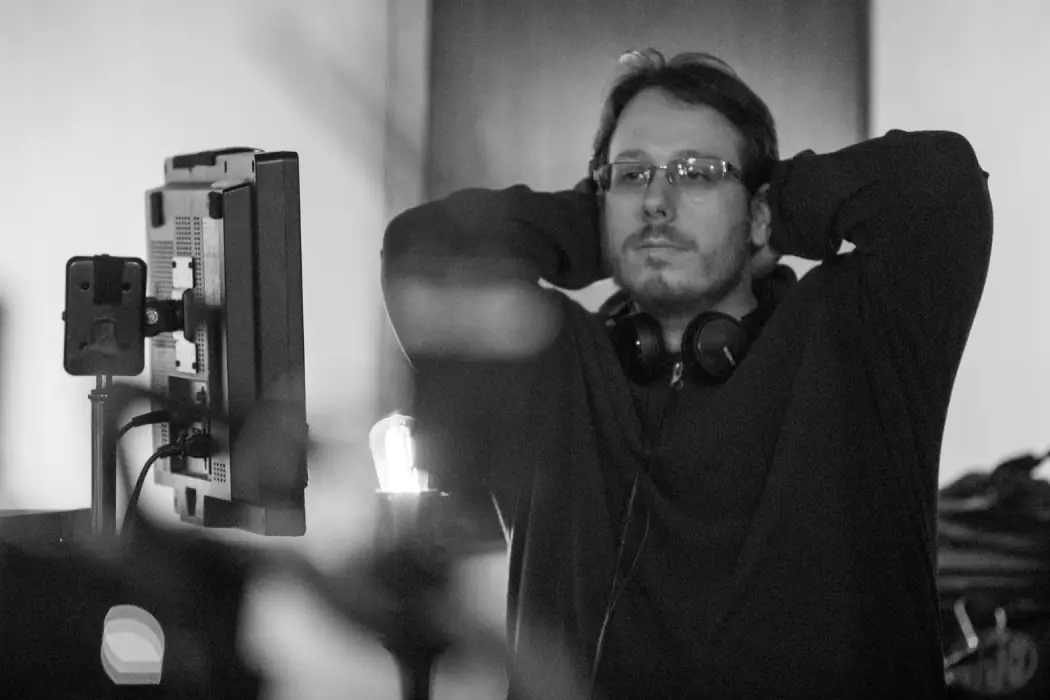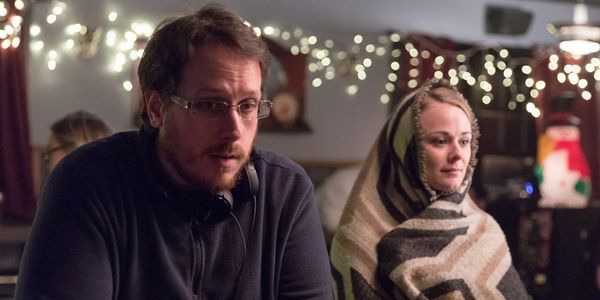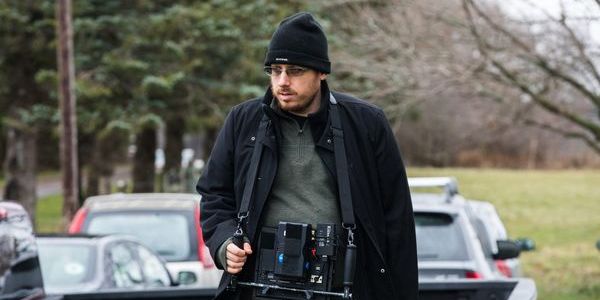Fantasia Film Festival 2020: Interview with Director Justin McConnell of CLAPBOARD JUNGLE

Wilson is a cinema enthusiast based out of Toronto, Canada.…
Justin McConnell‘s Clapboard Jungle is a documentary that is equal parts personal and educational and should appeal to any fan of the cinematic art form. Film Inquiry had a chance to speak with McConnell (virtually!) during the 2020 edition of the Fantasia Film Festival, where he was just as honest and transparent as he was in his remarkable film.
Wilson Kwong for Film Inquiry: Your documentary contains footage of yourself that was captured over a five-year period. Did you always know that you were going to make a documentary when you first started filming?
Justin McConnell: Oh yeah, I didn’t just start shooting myself for no reason. I feel like that would be insane! In early 2014, I was trying to figure out what I could do for next to no money, and about six months earlier, my previous documentary [Skull World (2013)] had come out. So I figured it’s going to be a while before I get a narrative movie made with any kind of real budget. And then that got the wheels turning that went, “oh, that process is interesting. I’m going to make a documentary about what it actually takes to get independent films made.” It just started as that seed of an idea, and I went out to buy a camera and just started shooting whenever I got a chance. And whatever opportunity I had to interview somebody, I just started and the result is five or six years later.
And did you know that the documentary would end up taking five years to shoot?
Justin McConnell: No, I had no idea it was going to take five years. In fact, the initial plan we had was for it to be out in 2016 because we did a crowdfunding on Indiegogo at the end of 2015. It wasn’t successful though, and we raised a quarter of the money that we were trying to get. And while I was going through the footage I had, there were a bunch of interviews, but there was no real story arc and no real ending. I figured it just had to be better. I went out to all the backers for the Indiegogo campaign through our updates and said, “listen, we’re going to keep shooting this. We will deliver everything, and we are going to deliver every single perk.” But we don’t want to handcuff the film and make it less than what we wanted it to be. So I just kept shooting until I felt like it was ready. And I finally felt like I had a story when Lifechanger was out and it did good Netflix numbers, and I had that whole festival run with it. I felt like, okay, well, now it’s kind of like Rocky. There’s a bit of an arc and an uplifting kind of ending. It just took us a while to get it edited because it was over 300 hours of raw footage and 120 interviews.
With so much footage not making it into the film, are you planning on releasing the full interviews outside of Clapboard Jungle?
Justin McConnell: Yes, we’re currently in post-production on an eight-episode educational series that uses a lot of the interviews. Every episode’s a topic and it’s not about my story anymore. It’s talking heads and every episode is sort of like an educational topic. We’ve got a pilot edited already and we’ve got four more episodes assembled, so we’re gradually putting that together. I sat with George Romero for over an hour, and I got Tom Holland for 90 minutes. There’s some very, very good stuff there that should see the light of day. So it’ll come out as educational modules and extended interviews, and you won’t be lacking in content in the long run on this. But for the initial movie, I just needed it to speak for itself and stand alone. It’s the gateway that gets you into all this other stuff if you’re really interested in learning more.
You document some pretty discouraging moments in the film where things weren’t necessarily working in your favor. Was there any point during that five-year period where you felt so discouraged that you thought about stopping the project?
Justin McConnell: Not necessarily while I was making it. There were periods of time, especially with regards to the documentary where I went, “I don’t know if anyone’s ever going to want to watch this.” But there were definitely times where I was unsure the documentary would amount to anything. I had a friend that bluntly asked me, “I’ve known a couple of people who tried to make a documentary like this and they never finished it. Are you going to finish yours?” This was back in 2015. I had a long hard think about it and was like, “yeah, I’ll finish it.” It took a long time to get to that point, but I didn’t stop.
What about filmmaking in general? Did you ever think about quitting that?
Justin McConnell: In terms of a filmmaking career, I haven’t felt like quitting for maybe a decade now. But there are definitely periods of time where you get to a low enough point and go, “ah, man, I should just take a big break and come back at this.” And you do. You put scripts in drawers and you step away from things. But I think the only time I truly felt like quitting was in 2010. I made a movie called The Collapsed, which I made for $40,000 upfront. It’s a tiny movie that we shot in 15 days. I wrote it in three weeks and wrote it way too fast. It has flaws and I’ll fully admit that. But it got released across Canada theatrically up against a bunch of studio movies and almost every single major newspaper in Canada reviewed it. Almost all of them were terrible reviews. This thing that I poured blood, sweat, and tears into it and scraped together money to make just because I wanted to make a movie, is in the same paper right next to whatever big release was coming out back then. You’ve got the one and a half star review for mine and the four-star review for the studio thing, and it just was crushing. This was also because the first few reviews I’d gotten on the movie a couple of months earlier were positive. So I was on a high of positive reviews and then every major paper in Canada was like, “no, man, you suck balls.” It was a very low night. I was like, “what’s the point?”
But perspective is the kind of thing that tells you to make more and keep learning from your mistakes. It’s not as bad as they’re saying, but there are definitely valid points there. Then you gradually grow a thick skin as you keep making more and more stuff. You also realize nobody agrees on anything, and there are always going to be people who hate your stuff.

Do you think that all independent filmmakers strive to become ‘big’ and work for a big studio? I assume the answer is probably no, but it seems like this is an assumption that a lot of people make.
Justin McConnell: I think a lot of people assume that a filmmaker’s end goal is to be the next Spielberg or Nolan, making $200 million blockbusters. And sure, it’d be nice to make a movie like that, and nobody’s going to turn that down. But I think people’s reasons for making films are as diverse as the kind of people that are in the world. The reality is that if your ultimate goal is just to make good films, it might not be the studio route you’re pursuing. And there are lots of people who are legends who did not take the studio route. Georgia Romero‘s a great example of a guy who stayed completely separate from the studio system almost the entire time, and the couple of studio movies he did were for Orion Pictures and he had almost complete control over (to some degree). I think it’s entirely possible to be happy outside of the studio system. I’m not saying I’m always going to be outside of the studio system. If the right opportunities come along, I’d be nuts not to.
But I don’t think everybody’s end goal is just to make the biggest movie possible and be on 2,000 screens. It’s not my end goal either. I just want to make good films that people enjoy. Ultimately, my only real goal in this business is that when I’m 80, a bunch of kids grew up with little sections of their video or digital shelf, which are my movies. The same as I’ve got shelf after shelf of movies here with my John Carpenter section and Takashi Miike section. As long as I’m on one geek’s shelf like that, I can die happy.
Clapboard Jungle focuses a lot on the film festival circuit and how it can impact an independent filmmaker’s career. With festivals being so different these days, how do you think it’ll impact the industry as a whole?
Justin McConnell: I think it’s too early to tell. It’s been interesting in that I was really hesitant about digital festivals when this first started, particularly because I know that anything with a screen can be captured and linked pretty easily. I was really skeptical that platform forms like Shift72 would actually protect the films because I just expected them to leak immediately. We opted in for Fantasia, and so far – knock on wood – nothing’s leaked and the press has been awesome. We also found distribution and it worked very similarly to how the regular festival scene works. That side of it is cool.
What is weird was it’s kind of a give and take. My world premiere of Clapboard Jungle was actually in early June at the Canadian Film Fest, which was a broadcast television festival. They broadcast films across Canada on a television channel, and when the actual premiere rolls around, I’m sitting alone with a scotch in my apartment in my boxers going, “I hope people like watching this movie when they watch it on their TV at home.” Nobody is around you. There’s no feeling of camaraderie. There’s no elation, there’s no celebration. It’s like you’re watching a movie on Netflix on a Friday night and you’re going to pass out afterward. That was my premiere night. That’s a very different feeling from the past.
So do you think digital film festivals work?
I do think these digital festivals work. I think they have the same benefit for people as an actual physical festival, minus the networking which is such an important part of the festival scene. That stuff is super important to a filmmaker because it builds your support structure going forward. So at the festival level, I think it’s going to be a hybrid moving forward. I think there’ll be physical screenings and I think there’ll be digital screenings. I think what this situation has done is accelerate the speed of the change over from the theatrical experience. What was going to be a five to ten-year process of balance is now going to shift more and more digital because this has just sped everything up. The theatrical windows are collapsing and people are realizing that digital actually does have a bigger benefit than theatrical in some cases.

Let’s end off by talking a bit about your future projects. Is Mark of Kane (which is mentioned a lot in Clapboard Jungle) still being developed?
Justin McConnell: It’s still alive. We were actually in casting when COVID hit, and we were set to start shooting in Australia in May. We were making offers out to actors when it hit and then we had to shut everything down. We had our budget together, but whether or not we’ll still have these partners (for funding) when this is all said and done, I don’t know. That’s just the reality. I’ve also got a bunch of other scripts that I’ve farmed out to people. I’ve got a really cool cyberpunk or action movie called Tracer that I’m trying to get made. I’ve got a short film here called Soul Contact, where I task myself to do everything because I live alone. So, I did the score, I acted and I shot the whole thing myself just for fun. And of course, we’re working on the eight-episode Clapboard series. And for the heck of it, even though I put it down for 10 years, I started playing music again this year and I’ve written an entire album. It should be out near the end of September or early October. It’s like a symphony metal industrial kind of thing called Cathode Raid. Anyway, I don’t know. I hate to be bored.
That’s not a bad trait to have for someone who likes to be creative.
Justin McConnell: That’s debatable because if you’re too split-focus, then you’re a jack-of-all-trades and master of none. You don’t necessarily want to be that. But I put effort into everything that I do and it’s always going to have varying degrees of success. As long as I’m happy with it, that’s ultimately what matters in art. It’s that the creator is happy with it. If you are an audience, then other people will also be an audience.
Clapboard Jungle emphasizes the point that there’s so much content out there these days. How and where do you personally consume your content?
Justin McConnell: Like an addict. I consume it in all kinds of ways. I love the theatrical experience, so before this, I attended festivals. I traveled the world attending festivals, and I’m a programmer for Toronto After Dark, so it’s also part of my job. But beyond that, I’m just an obsessive cataloger of media. I’m subscribed to every streaming service and I’ve been collecting physical media since I was like 12 or 13. So I’ve got VHSs, Blu-rays, DVDs and I’m always ordering stuff. I also have region free players so that if I wanted to get the two Tiger’s Claw movies on Blu-ray, you better import that in from Hong Kong, right? And it’s not even just movies, it’s television too. I watch every weird Adult Swim series I can. I watch British television and South Korean melodrama. I think I just like visual storytelling as a medium.
Fantasia will be hosting an added virtual discussion between Justin McConnell and Vincenzo Natali on September 3rd, 2020 at 3pm EST. The full conversation can be streamed here.
Does content like this matter to you?
Become a Member and support film journalism. Unlock access to all of Film Inquiry`s great articles. Join a community of like-minded readers who are passionate about cinema - get access to our private members Network, give back to independent filmmakers, and more.
Wilson is a cinema enthusiast based out of Toronto, Canada. He escapes from his day job by writing random thoughts about cinema on the internet. Although he has a longstanding penchant for Hong Kong cinema, he considers himself to be an advocate for Asian cinema in general. He has been attending the Toronto International Film Festival every year since 2005, and more of his work can be found on his website: www.wilson-kwong.com.













